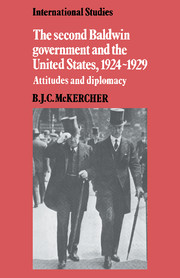Book contents
- Frontmatter
- Contents
- Acknowledgements
- List of abbreviations
- 1 THE SECOND BALDWIN GOVERNMENT AND THE UNITED STATES, NOVEMBER 1924–JUNE 1929
- 2 FOREIGN OFFICE PERCEPTION OF REPUBLICAN FOREIGN POLICY, NOVEMBER 1924–MAY 1927
- 3 THE ONSET OF NAVAL DEADLOCK, JUNE–AUGUST 1927
- 4 BELLIGERENT VERSUS NEUTRAL RIGHTS, AUGUST–DECEMBER 1927
- 5 THE PACT TO RENOUNCE WAR, JANUARY–JULY 1928
- 6 ARBITRATION, BELLIGERENT RIGHTS, AND DISARMAMENT, JANUARY–JULY 1928
- 7 THE CRISIS IN ANGLO-AMERICAN RELATIONS, AUGUST–NOVEMBER 1928
- 8 THE AMERICAN QUESTION RESOLVED, NOVEMBER 1928–JUNE 1929
- Notes
- Bibliography
- Index
4 - BELLIGERENT VERSUS NEUTRAL RIGHTS, AUGUST–DECEMBER 1927
Published online by Cambridge University Press: 10 November 2009
- Frontmatter
- Contents
- Acknowledgements
- List of abbreviations
- 1 THE SECOND BALDWIN GOVERNMENT AND THE UNITED STATES, NOVEMBER 1924–JUNE 1929
- 2 FOREIGN OFFICE PERCEPTION OF REPUBLICAN FOREIGN POLICY, NOVEMBER 1924–MAY 1927
- 3 THE ONSET OF NAVAL DEADLOCK, JUNE–AUGUST 1927
- 4 BELLIGERENT VERSUS NEUTRAL RIGHTS, AUGUST–DECEMBER 1927
- 5 THE PACT TO RENOUNCE WAR, JANUARY–JULY 1928
- 6 ARBITRATION, BELLIGERENT RIGHTS, AND DISARMAMENT, JANUARY–JULY 1928
- 7 THE CRISIS IN ANGLO-AMERICAN RELATIONS, AUGUST–NOVEMBER 1928
- 8 THE AMERICAN QUESTION RESOLVED, NOVEMBER 1928–JUNE 1929
- Notes
- Bibliography
- Index
Summary
The issue of naval equality having now been squarely joined at Geneva, naval competition between the two countries will continue to be an important factor in their relations unless some means can be found of eliminating this ‘blockade’ difficulty.
Craigie, August 1927British reaction to the naval deadlock
For the Baldwin government, the immediate result of the Coolidge conference was Cecil's decision to resign. Cecil's ministerial career had been distinguished by his reliance on the threat of resignation if policy did not develop in the way he thought it should. He had held ministerial rank for an aggregate of only seven years and, in that relatively short time, he had resigned twice and threatened resignation nine times. Cecil was unable to sacrifice his personal convictions for what he believed to be political expediency. The great difficulty with him was his failure in the heat of the moment to appreciate fully the repercussions of resignation. In 1917, when he was a junior minister at the Foreign Office under Balfour, he felt that he had to resign over some minor point. This forced the normally patient foreign secretary to speak harshly to his cousin. Balfour pointed out that if Cecil tendered his resignation, he, Balfour, would be forced to resign as well. Cecil's withdrawal would be interpreted as a censure of the government's foreign policy, which was Balfour's ministerial responsibility.
- Type
- Chapter
- Information
- The Second Baldwin Government and the United States, 1924–1929Attitudes and Diplomacy, pp. 77 - 103Publisher: Cambridge University PressPrint publication year: 1984



